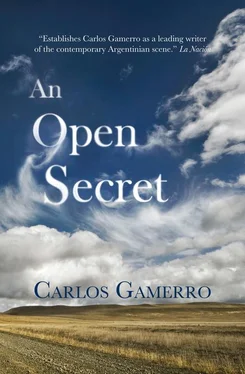“Neri,” he replies. “Superintendent Neri. Who’ve we been talking about all this time? Wasn’t it him? Weren’t we talking about Neri?” he asks and asks again, without a trace of irony, just to make sure his incipient dotage hasn’t got the better of him again.
“CASARICO? Told you that? Very odd che , Don Eugenio’s memory must be going, sounds like he’s going gaga on us. But anyway anyone in town can give him a hand if he needs it jogging, ’cause even people who hadn’t been born know he was one of the first to give Ezcurra the thumbs down. There was no need to say anything, Casarico’d had it in for him ever since Ezcurrita was in the Council and waged war on the Yacht Club”—Iturraspe, with eyebrows arched, would feign an astonishment he doesn’t really feel a couple of nights later at the table of Los Tocayos.
“HE’D ALREADY MADE UP HIS MIND about Ezcurra, no one’ll persuade me otherwise, when’ve you ever heard of a police chief knocking on people’s doors and asking them for permission, least of all in those days.” Don León rearranges his buttocks on the bar chair in Los Tocayos, rests his elbows on the table, and leans confidentially forward. “Mark my words Fefe my friend, what Neri wanted was to kill two birds with one stone, find out if Ezcurra was working alone or if there were others with him and see if he could reel in someone else to boot. It’s the only way to explain it don’t you agree? The survey wasn’t about him, it was about us. Ezcurra’s fate was signed and sealed, nothing you could’ve done or said would’ve changed it, the only thing you’d’ve achieved by defending him was to be tarred with the same brush. I realised straight away, Neri might’ve been a sly old fox but he wasn’t pulling the wool over my eyes. He came to see me at the bar on the island, a weekday it was, Tuesday I think, ’cause the beer had run out and the order didn’t come till Wednesday morning, I had a licence to run the power plant and the bar back in those days, did you ever? …” I answer that I did, recalling a high counter I had to stand on tiptoe to rest my elbows on, a huge wooden fridge, the metal tables on the sand under the shade of the pines. “We chatted about this and that, don’t ask me what, I knew what he was up to and I was ready for him, but Neri wasn’t saying a word. Course he was doing it on purpose to make me feel uncomfortable, playing cat and mouse like, but forewarned is forearmed and when he started rubbing his butt end round and round the ashtray and saying Listen León my friend there’s something I want to talk to you about I was on my guard and I said to myself mentally let’s see if you can trip me up. This Ezcurra lad, right, you know him better than I do, what can you tell me he says to me and I go Only what the whole town knows Superintendent, no more no less, and he goes And what might that be, whereupon I gave him an outline, I mean I had to give him something or he’d’ve smelt a rat: his role in the Council, his journalism, his business dealings, his run-ins with the fair sex. That’s odd, the Superintendent replies, I always thought you two were friends and I go I don’t know who can’ve handed you that story, Superintendent,” Don León tells me and then adds, “I still wonder today. At first I suspected Casarico, who was Chairman of the Yacht Club at the time and had started legal proceedings against me supposedly for failing to meet the conditions of the franchise, which he wanted to get his hands on himself … A long-drawn-out lawsuit that benefited neither party it was, still involved in it we were when the great flood of eighty-three swallowed up everything — the power plant, the bar, the whole island — and we didn’t have anything to fight over any more.” Don León chortles philosophically and goes on, “Perhaps it was a lesson to us all, let bygones by bygones, why keep poking around in lost causes, but Casarico was actually one of the first to be consulted and no one’ll persuade me otherwise, he was the one as fingered me to the Superintendent. I can forgive, Fefe, my friend, but not forget. And I’ve got a memory like an elephant I have,” says Don León.
“THE WHOLE TOWN’S RESPONSIBLE,” Mauro Mendonca asserts while the winter rain runs down his pharmacy window. “Neri made quite sure of that all right, by making us all accessories I mean. Which doesn’t exempt us from blame by any means. At the very least we erred by omission; if we did nothing to condemn the poor boy, we didn’t do enough to save him either. Imagine if we’d all answered Neri’s surveys with a resounding no, it would’ve been a very different kettle of fish. His methods were of course based on the police strategy of questioning witnesses separately and using the supposed allegations or betrayals of one against another. Neri subtly led every new subject he consulted to believe that the previous ones had given their approval — or acquiescence at least — and I can vouch for it … From one person to another he gradually spun his net and we’re responsible at least for that — for acting as supports. And as is often the case with such traps, the harder you try to wriggle free, the more caught up you get … At one point I had this outlandish idea of turning the tables on him, fighting fire with fire as it were, and conducting a counter-inquiry that reflected our true position as a community — because if Neri’s visits connected us all, they only served to divide us … So, once his visit was over, I approached two or three of my neighbours, dependable folk — I won’t name names — and, with extreme caution, I made some enquiries of my own … One of them flatly denied any knowledge of the affair even though everyone knew not just that the Super had visited them, but the date and time of day too; the other two were evasive, vague, wanted me to tell them where I stood, put my cards on the table first, but I wouldn’t give them the pleasure; from that day on our mutual trust gave way to mutual suspicion for many years to come … Years later one of them would confess to me that he thought I’d been sent by Neri that night to check on the truth of what he’d told him and that that was why he’d been so guarded … What Neri was doing was so extraordinary, so unprecedented, that it wasn’t surprising most people felt that there was something fishy going on, that behind every one of his questions there might be another question, the real one, one that wasn’t about poor old Ezcurra, but about ourselves.”
“LOOK AT IT THIS WAY. How many died in Argentina then? Thirty thousand you say? I think that’s stretching it, there can’t have been more than … say, ten thousand — just to make my argument more mathematically elegant. Because unless I’m mistaken the population at the time was twenty-five million, you remember don’t you? ‘Twenty-five million Argentines off to win the World Cup.’ So, if you work out the ratio, you’re talking about one victim every two thousand five hundred inhabitants, correct me if I’m wrong. And here in Malihuel we had just one and there were three thousand of us at the time. In other words we short-changed them, especially when you think that Malihuel’s the administrative centre of the county and ought to have set an example. I know what you’re thinking,” Don Honorio Moneta rashly claims in the plush living room of his Rosario apartment, which his comfortable pension as manager of the Malihuel branch of the Banco Nación allows him to enjoy in peace and quiet, and whose doors — the front door, the lift door and the door to the private landing graced by Monet’s Poppy Field, spotlit by a little brass wall lamp — have been opened to me by the ministrations of my grandmother, who I’ve come to visit on a weekend break. “You find my line of argument cynical, and I’ll admit to you my young friend that so it may seem at first sight. But you’re young and can’t remember what our country was going through. I don’t mean to justify what happened, simply to point out that what happened in Malihuel happened throughout Argentina. That’s what I’m saying, if we’re going to judge Malihuel, we have to judge the country as a whole. Malihuel isn’t an island and if things are the same everywhere else, why not here too?” he says and then smiles pensively and strokes the velvet of his armchair, faded by the sun from emerald to moss green. “Gracious me. It’s been more than ten years since I left and I still say here instead of there. People have short memories. You had to live through those years, occupy an exposed post like mine before you jump to conclusions. Every day lived was a day stolen from the hold-up or kidnapping the guerrillas had planned for me, and the nightmares wouldn’t let me sleep at night. A moving target, that’s what I felt like at the time. A moving target. Ezcurra may not have taken up the gun — I’m not so mean-minded as to deny the fallen enemy the benefit of the doubt — but it was his preaching and the preaching of others of his ilk that trained the sights on those of us who held the fate of the community in our hands. So I’m not ashamed to have given my consent.”
Читать дальше












